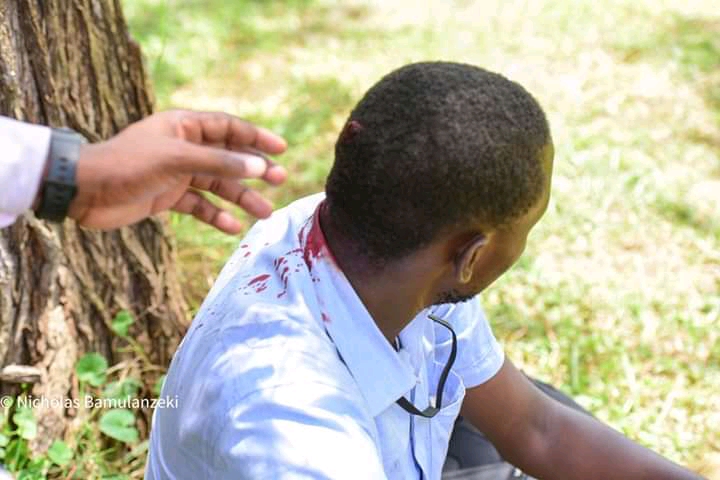Following the brutal violence by military police on Wednesday in Kololo Kampala, a number of media personalities have condemned the acts of brutality that have continuously unleashed on them, saying that journalism is not crime.
Journalists, after covering the presser by the National Unity Platform-NUP officials which took place in Kamwokya at NUP’s Secretariat, they followed Robert Kyagulanyi Sentamu to cover the handover of the petition to United Nations Human Rights-UN offices, located at Prince Charles Drive, Kololo, on alleged human rights violations that marred the electoral process, however, this did not go well with whoever was trailing the NUP delegation.
A number of journalists sustained serious injuries after the scuffle between military and journalists who were covering the event. These include; Irene Abalo Otto of daily monitor, John Cliff Wamala of NTV, Timothy Murungi and Henrely Ssekanjako of New Vision, Josephine Namakumbi, Joseph Sabiti and Thomas Kitimbo of NBS, Amina Nalule of Galaxy among other journalists.
Moses Mulondo, the President of Uganda Parliamentary Press Association-UPPA, in a statement said the continued acts of brutality against journalists on duty by security forces are in violation of press freedom guaranteed in article 29 of the Uganda constitution.
Mulondo said that in the past, there have been so many other nasty incidents of police and military officers assaulting journalists with impunity.
He called upon the media owners, managers and editors to cooperate with their reporters in undertaking tough measures against the impunity of security forces like boycotting the coverage of their activities until commitment to end the barbaric acts is made.
Uganda Journalist Association-UJA issued a statement condemning the act and said that, this act is a continuation of unprecedented illegal assaults and brutality against journalists performing their constitutionally mandated duty of keeping the public informed.
“While we have engaged the security agencies on the issue of guaranteeing, the Safety of journalists, our efforts have been shamelessly and rudely ignored.” The statement reads in part.
Halima Athumani took it to her social media platforms and wrote that whenever journalists are out covering especially potentially risky stories, they always gather and tell each other that the most dangerous security officer in the field is a military police officer, the ones with red berets.
“We have always agreed that if a military police officer confronts you, you either try to charm them as you move away from the risk or just give them your equipment if they ask for it. We know how lethal they are and never want to get in their way,” she writes.
Damali Mukhaye of daily monitor noted that “someone cries telling you that I am a journalist but you continue beating them. Some journalists never learn a lesson. Every journalist should know that the Police/military don’t have friends when it comes to beating, so colleagues always watch out.”
Some journalists called upon fellow journalists to stop covering activities of government until they start respecting the works of media personnel. Joseph Balikuddembe of CBS said that “I argue with fellow scribes to stop covering the NRM government until it exits power because it does not value the work of journalists”.
Andrew Mwenda, the CEO of Independent news paper and magazine wrote on his social media platforms that NRM government, in characteristic style, used military police to unleash violence against a group of activists escorting Bobi Wine to the UN Human Rights office to deliver a petition.
Mwenda says it was the same old style, with added level of brutality this time mercilessly employed against journalists.
“I am even more shocked some Ugandan elites think this is new. The use of violence has been a characteristic feature of NRM from its inception” Mwenda noted.
Robert Ssempala of Human Rights Network of Journalist of Uganda called this a misfortune, adding that the fact that it has been repeated several times and the security agencies are not showing any changes in their brutal acts, it should be handled on a serious note.
The Kampala Metropolitan Police Spokesperson, Patrick Onyango in a press statement, said that it was done due to overcrowding of people yet they had warned people to avoid converging, as one way of preventing the spread of Covid-19 virus.
“Due to the acts of overcrowding at the security perimeters near UN offices, there was a great potential of breaching the security perimeter, which led to additional reinforcement that helped disperse the uncontrolled crowds. Unfortunately, a few people sustained injuries including journalists,” Onyango adds.
On several occasions, security agencies have battled journalists without any reason given. Security accuses the media of failing to be neutral when it comes to reporting on security issues.
In one of the security press briefings at Naguru Police Headquarters, the IGP Martin Okoth Ochola said police batting journalists intended to stop them from being harmed and he dared never to apologize for police’s acts of brutality towards journalists.






